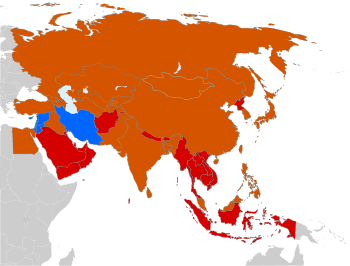Daylight saving time in Asia
As of 2017, daylight saving time is used in the following Asian countries:








By country

The People's Republic of China experimented with DST from 1986, but abandoned DST from 1992 onwards. The PRC now uses one time zone (UTC+8) for the whole country.

The British first instituted summer time in Egypt in 1940, during the Second World War. The practice was stopped after 1945, but resumed 12 years later, in 1957.[1]
Before the revolution in January 2011, the government was planning to take a decision to abolish summer time in 2011 before President Hosni Mubarak's term expires in September 2011. The transitional government did so on 20 April 2011.[2]
Under the pretext that daylight saving time would save energy, the Egyptian government decided on 7 May 2014 to reinstate summer time with an exception for the holy month of Ramadan.[3] In April the next year, a poll was held on whether to apply summer time or not. Following the results, the government decided on 20 April to temporarily cancel summer time, to make the necessary amendment to the laws and asked the ministers to work on a study to determine the probability of applying DST in coming years or not.[4] The ministry of electricity assured that the achieved electricity savings from applying summer time is not of any tangible effect.[5] Summer time was expected to return in 2016, starting on July 8 (after Ramadan), but on July 5, it was decided to again cancel it.[1]

Hong Kong used DST beginning in 1941, but abandoned it from 1980 onwards.[6]

India used Daylight Saving Time (DST) briefly during wartime in 1942–1945. Currently, India does not observe DST.

Iran observed DST in 1977–1980, 1991–2005 and since 2008 from March 21–22 (1/1 Iranian calendars) to September 21–22 (6/30 Iranian calendars).

Israel observed DST in 1940–1946, 1948–1957, 1974–1975 and since 1985. Currently, DST is observed from the Friday before the last Sunday of March to the last Sunday of October.[7]

Jordan UTC+3 observed daylight saving time from the last Friday of March to the last Friday of October. On October 24, 2012, Jordan decided to continue observing daylight saving time for an entire year, ending in December 2013.[8][9]

Kazakhstan made a decision to stop observing summer time in 2005, citing health complications as well as lowered productivity and a lack of economic benefits.[10]
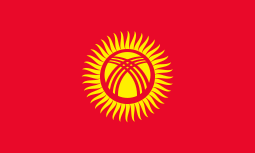
Kyrgyzstan voted to stop observing DST in 2005 and make UTC+6 as Standard Time (which used to be Kyrgyzstan Summer Time), thus having permanent DST due to the timezone shift.

Malaysia used DST from January 1, 1933, but discontinued on December 31, 1981 to replace DST with Malaysian Standard Time.

South Korea observed DST from 1948–51, from 1955–60, and from 1987–88. South Korea does not currently observe DST.

Syria observed DST at UTC+3, in 2006 from 30 March until 21 September (a change from 30 September). Now, DST is observed from the last Friday of March to the last Friday of October.

Taiwan implemented DST from 1945–61, revoked DST from 1962–73, reinstated DST from 1974–75, revoked DST from 1976–79 and reinstated it in 1980. Taiwan abandoned DST from 1981 onwards.

Turkey is currently observing year-round daylight saving from September 2016. DST was used from 1985–2016.
Asian countries not using DST
These countries or regions do not use daylight saving time, although some have in the past:
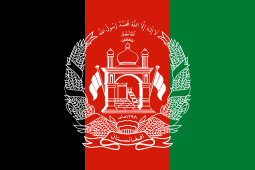





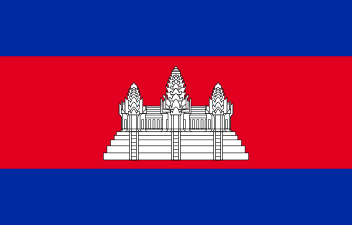








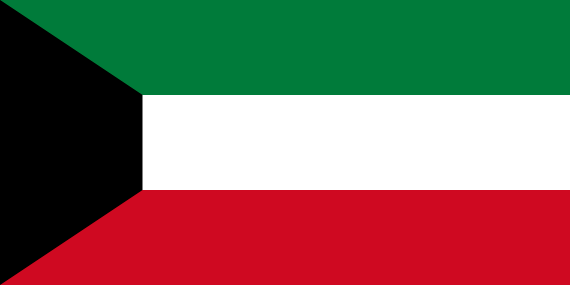

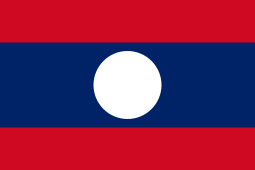

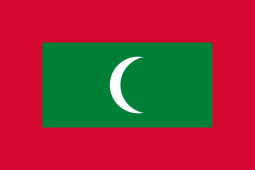














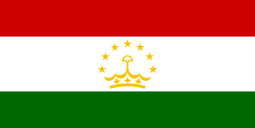


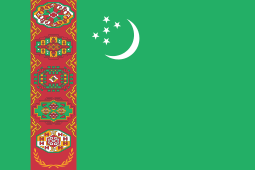

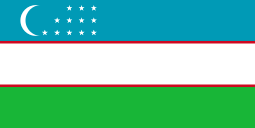


References
- 1 2 Taylor, Adam (July 6, 2016). "Egypt canceled daylight saving time three days before it was due to start". The Washington Post.
- ↑ "Egypt to cancel daylight saving time".
- ↑ "Daylight saving to be applied in Egypt starting Friday".
- ↑ "No daylight saving this summer: Egypt's prime minister".
- ↑ "Council of Ministers Postpones Using Summer Time This Year". (in Arabic)
- ↑ "Hong Kong Observatory: Hong Kong Summer Time". Hong Kong Observatory. 2009-10-02. Retrieved 2010-06-25.
- ↑ "Knesset votes to extend Daylight Saving Time". jpost.com. 8 July 2013. Retrieved 2013-07-08.
- ↑ Faris Abawi (24 October 2012). الغاء التوقيت الشتوي. Al Rai newspaper (in Arabic). p. 1. Archived from the original on 2012-10-27. Retrieved 2012-10-24.
- ↑ "Jordan cancels decision to switch to wintertime". WorldTimeZone.com. 24 October 2012. p. 1. Archived from the original on 2013-01-27. Retrieved 2012-10-24.
- ↑ "Kazakhstan abolishes daylight saving time". Kazakhstan Society in the UK. 2005-03-21. Archived from the original on 2007-01-06. Retrieved 2007-03-28.
